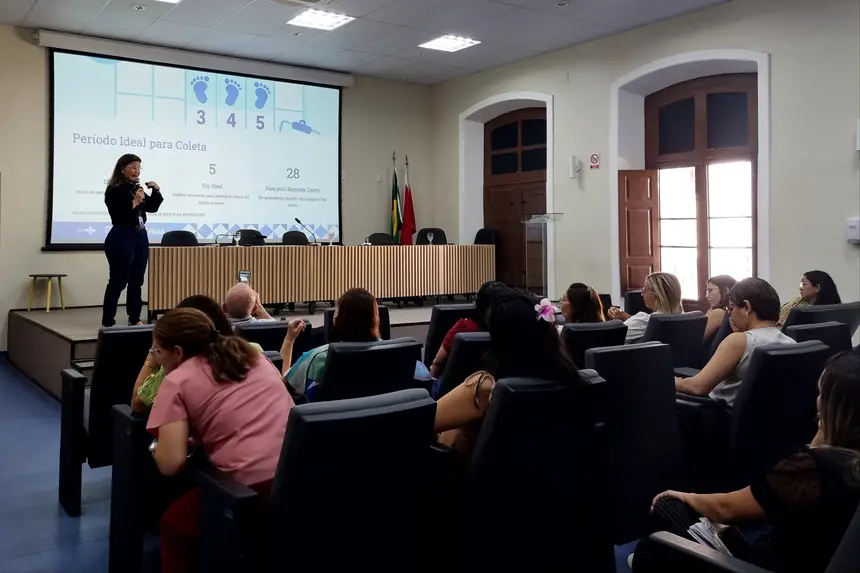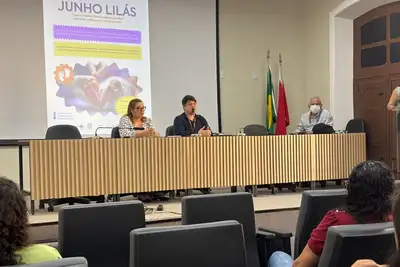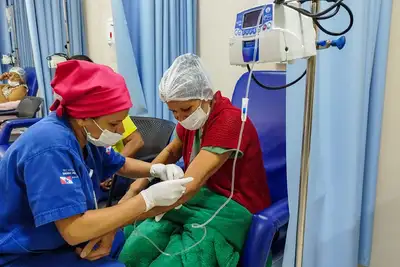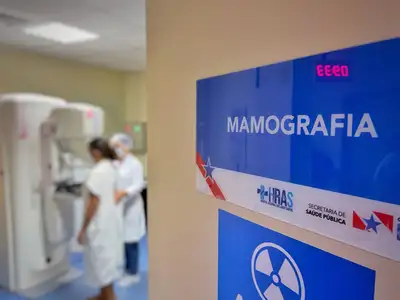Event at Santa Casa raises awareness about the importance of the heel prick test
The implementation of this public health procedure can make a difference in the patient's life by enabling early treatment of various diseases
About 50 health professionals working in the Basic Health Units (UBSs) of Belém and in the state public health network participated on the morning of this Monday (16) in the event commemorating the national June Lilac campaign, held in partnership by the State Department of Public Health (Sespa), the Municipal Health Department (Sesma), and the Santa Casa Foundation. The objective was to raise awareness about the importance of the heel prick test for neonatal health when performed between the 3rd and 5th day after birth.
According to Dr. Hélio Franco, who represented the Child Health Coordination of Sespa, ensuring access for newborns to the heel prick test is an obligation of the State and society, which is why it is important to have qualified professionals.

"It’s not just about doing the test, but also about guiding, training, empowering, and raising awareness among all health workers. And these health workers, also in their municipalities, in their localities, should raise awareness in the community and among leaders about this, because there are still children who end up not taking the test. It is necessary for the entire community to know about this issue, to disseminate it as much as possible, and to ensure this right for the child," stated Hélio Franco.
Prevention - The heel prick test can be a game changer in the patient's life, as if any disease is detected during screening and confirmed by additional tests, early treatment can be initiated, explained the Assistant Director of the Santa Casa Foundation, Norma Assunção, who was present at the opening of the June Lilac program.
"Bringing the importance of the heel prick test to this event is fundamental. We can only prevent these diseases from becoming severe if we take preventive measures, and the test provides the possibility of early diagnosis of a number of diseases that, if untreated, can be very serious," emphasized the doctor.

The representative of the Health Department of Belém, Victor Maués, highlighted that the event contributes to the exchange of experiences between the State and the Municipality. "This program facilitates communication with people and allows us to meet outside the Sesma space, to get closer to society and learn from other experiences, in addition to sharing our own experiences.
Nurse Diana Lobato spoke about Santa Casa's experience in neonatal screening, through the provision of the heel prick test to premature newborns and those born in the Hospital. "At Santa Casa, we have an experienced team that performs the heel prick test in the testing room and at the bedside. As a reference in maternal and child care, Santa Casa serves many low-birth-weight premature babies and babies receiving blood transfusions, and is prepared for this specialized and differentiated care," stated the nurse.
Diseases detected by the heel prick test:
Phenylketonuria - an amino acid metabolism disorder that occurs in babies born without the ability to normally break down the amino acid, which can lead to brain damage if untreated;
Hypothyroidism - a deficiency in the production of thyroid hormone, which can cause developmental delays and cognitive problems;
Sickle cell disease - causes deformities in red blood cells and anemia;
Cystic fibrosis - a genetic disease that affects the lungs and other organs, causing excessive mucus production and respiratory difficulties;
Congenital adrenal hyperplasia - affects the adrenal glands, causing excessive production of male hormones and other problems;
Biotinidase deficiency - a genetic disorder that affects the production of the enzyme necessary for processing biotin vitamin. It can cause various developmental impairments.
Congenital toxoplasmosis - an infection caused by the protozoan Toxoplasma gondii, which can cause harm to the fetus and the newborn.










